Freedom camping in New Zealand can be a wonderful way for international visitors to experience the country’s sheer beauty and take in its endlessly stunning landscapes for free. However, it’s not without responsibilities, and understanding your obligations when freedom camping is incredibly important.
If you’re curious to learn more about freedom camping, how it works, and how you can participate responsibly during your next NZ adventure, we’ve got you covered. Check out our complete guide to freedom camping in New Zealand below and allow Backpacker Deals to provide you with all the information you need to camp with care!
What is Freedom Camping?
As a growing number of tourists search for more flexible, low-cost ways to experience the country’s countless stunning landscapes, freedom camping in New Zealand has become increasingly popular with each passing year. But what is freedom camping, exactly, and how can you do it properly?
Put simply, freedom camping is when people visiting New Zealand camp on public land (excluding formal campgrounds or holiday parks) in a motor vehicle, tent, or other temporary structure. This public land could be a scenic parking area, a spot by the beach, by the side of the road, near an official Great Walks Track, or somewhere similar.
While the definition itself is pretty straightforward, there are quite a few rules that freedom campers in New Zealand must follow. These rules have been put in place to protect New Zealand’s precious wilderness, preserve its natural beauty, and maintain the reputation of all freedom campers.
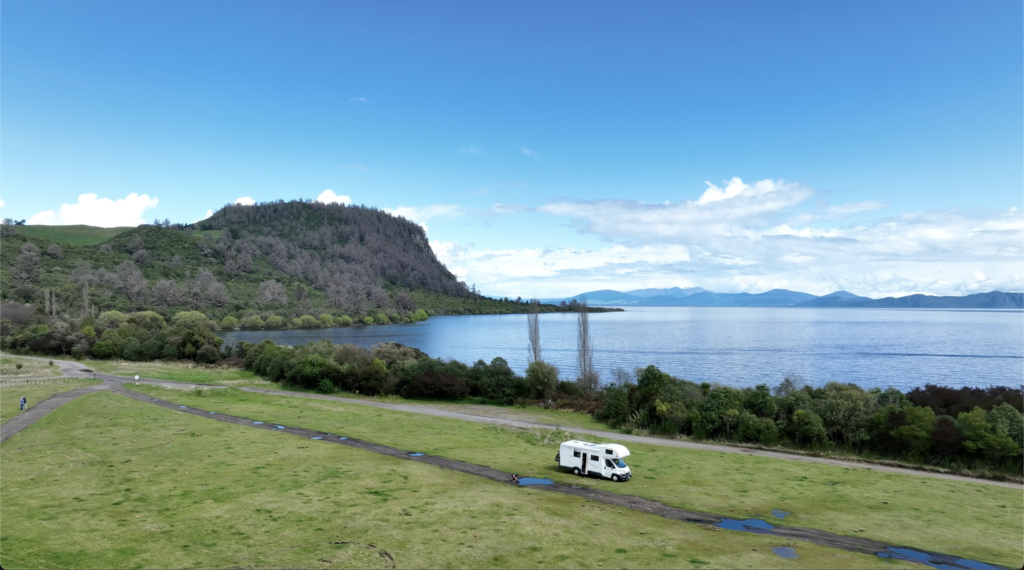
Freedom Camping Rules in NZ
To protect certain areas and avoid hefty fines, it’s important to properly understand the rules before going freedom camping in NZ. This includes knowing where you can and cannot stay, how to respect the space you’re camping in, and how to look after yourself during your trip. To make sure you’re familiar with your responsibilities before you set up camp, we’ve outlined the most important rules and regulations below.
Do Not Camp in Prohibited Areas
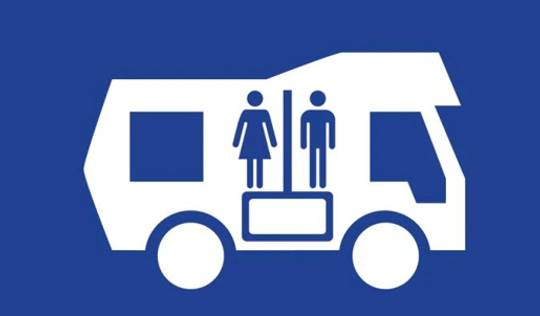
Freedom camping is predominantly permitted on public land managed by New Zealand’s Department of Conservation (DOC) or local councils. However, there are some exceptions to this, and it’s important to take note of which areas prohibit freedom camping before you set up camp for the night.
The majority of these prohibited areas tend to be near roads where inappropriate freedom camping has historically caused problems, or special conservation circumstances (such as a sensitive native species inhabiting the area) require camping activities to be restricted.
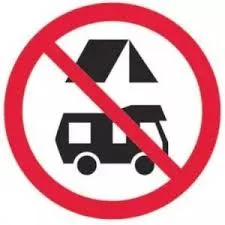
If you’re unsure whether you are allowed to go freedom camping in a certain area, there are a few things you can do to check. First, keep an eye out for any “no camping” signs or “self-contained vehicles only” signs in the area.
These signs can be found at off-limits public conservation sites across the country and they let people know when a certain area prohibits freedom camping. Unfortunately, not every prohibited site is signposted, but you can double-check whether freedom camping is permitted in a specific area by referring to a few different resources.
Check out the DOC’s interactive map of prohibited and restricted areas or peruse their comprehensive list of sites where freedom camping is banned or restrictions are in place for more information.
Alternatively, if you’d like to check whether you can go freedom camping on a specific council-managed site, you can find the appropriate local council for the area and check in with them directly.
Stay Safe
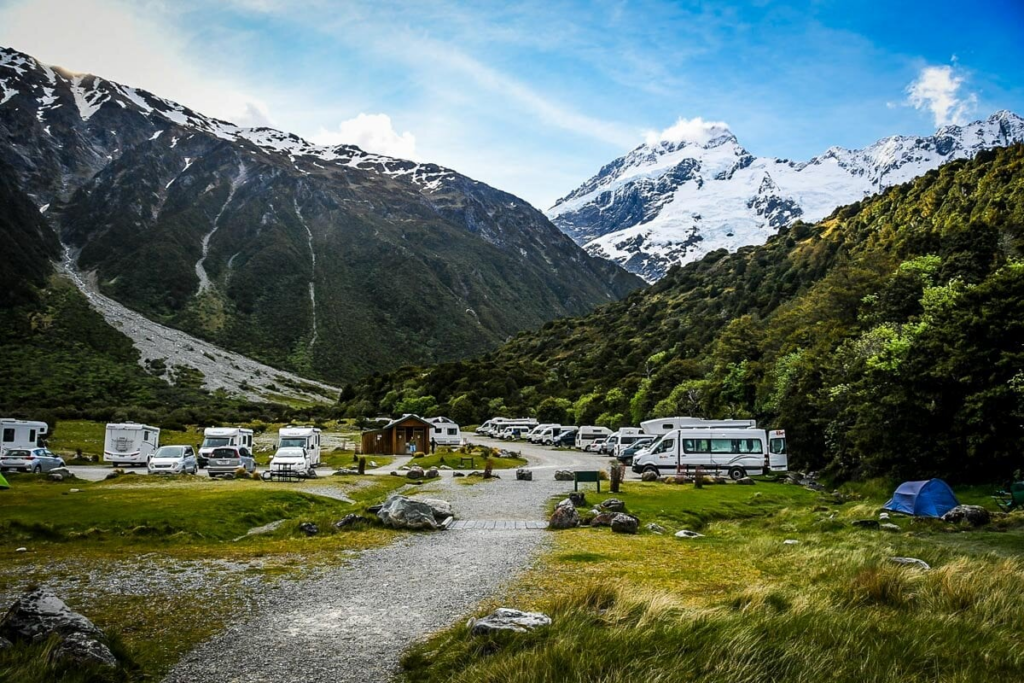
When freedom camping in New Zealand, looking after yourself is just as important as looking after the area you are staying in. As a wilder form of camping, it’s even more important to remain vigilant and take all the right precautions to stay safe from the elements and other potential hazards.
Firstly, make sure you set up camp in a safe spot away from risky areas such as roadsides, steep drops, and deep bodies of water. Ideally, your chosen spot should also be close to a public toilet block if possible. If you’re camping in a motorhome, you should also take care to lock your doors at night and place any valuables out of sight.
You should also check you have everything you need with you before you set off on your trip. This includes food, navigational equipment, a mobile phone, and any other essentials you will need during your trip. You should also pack warm clothing and wet weather gear, as New Zealand can get pretty cold and wet at times.
On that note, you should also stay updated on local weather warnings while travelling and camping. Never plan to travel in extreme weather, but if conditions get too wild unexpectedly, pull over somewhere safe, seek shelter, and wait it out before continuing your journey.
Last but not least, make sure you let someone know of your travel plans, including where you’re going, how long you’ll be gone, and when you expect to be back. This is especially important if you are freedom camping alone or you plan to do any hiking or similarly adventurous wilderness activities while you’re travelling.
Respect the Environment
This one might be a little obvious, but to protect and preserve NZ’s wilderness, you need to respect it. This means being mindful of your environment and taking care not to interfere with or damage any flora or fauna in the area.
Clean Responsibly

If you’re using a natural water source to clean with, only use biodegradable soaps and take care not to use these in or near the source itself. Even biodegradable soaps cannot properly break down in water, and using them in or near natural sources can lead to contamination, unintentionally harming the wildlife in the area.
To avoid this, you should use a container to take the water far away from the source (at least 200 ft) before you start cleaning. Then, once you’re finished, dispose of the used water (known as grey water) with care.
Freedom camping spots in NZ rarely have designated disposal sites for grey water, but you can still dispose of it responsibly by using a method called “broadcasting”. To do this, simply throw the grey water in a sweeping motion over some soil far away from the original source. This will help to evenly disperse the water and allow it to break down properly in the soil.
Cook Responsibly
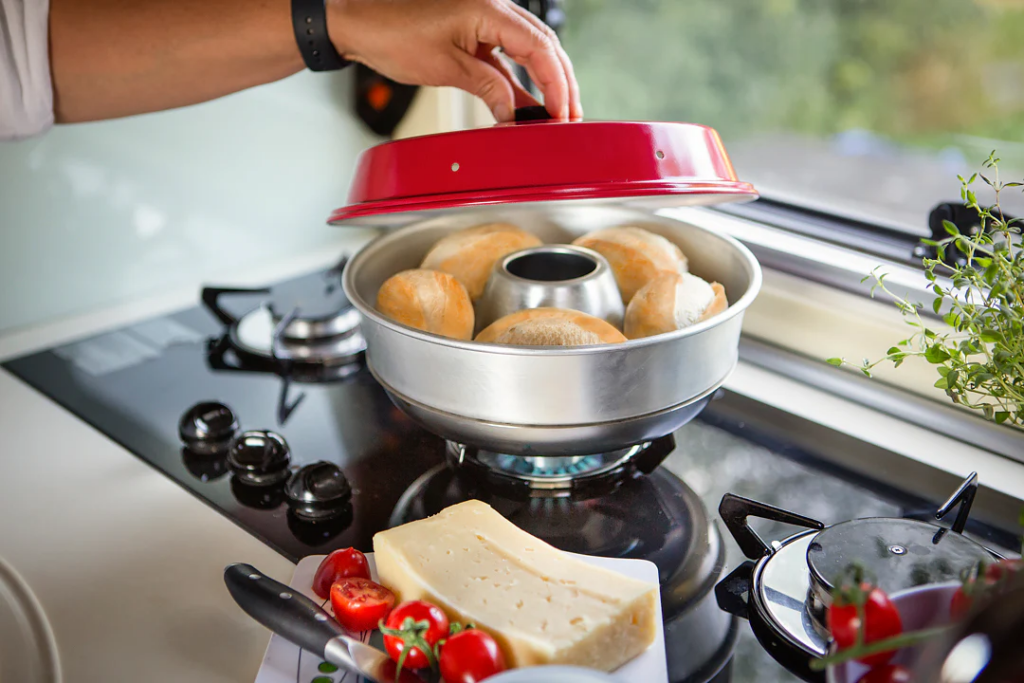
If you do any cooking while freedom camping, we recommend using a portable stove or the cooking facilities in your camper, as these have a lower environmental impact than fires.
If you need to make a fire to cook, you should first confirm that you’re permitted to do so. Open fires may be prohibited in certain spots, especially in dry periods, so make sure you check local fire restrictions before you get cooking.
When building your fire, keep it as small as you can and only use dead wood. Using dead wood not only prevents unnecessary environmental damage, but it is also easier to burn, saving you time and allowing you to build a more effective fire.
Once you’re done with your fire, make sure to extinguish it properly by dousing it with water. You should also check the ashes for food scraps or rubbish and remove anything left over before you leave.
Leave No Trace
On that note, you’ll also need to correctly dispose of any other rubbish you generate while camping to ensure you leave no trace when you depart.
You can dispose of this rubbish in the general waste and recycling bins provided. If there are no suitable bins in the area, please take your rubbish with you when you leave and dispose of it correctly when you next have the opportunity.
Speaking of waste… when nature calls, you won’t be able to use it as your own personal bathroom. Instead, anyone freedom camping in NZ is required to use the restroom facilities located nearby or on-site. If your chosen camping location doesn’t have restrooms, you’ll need to camp in a specific kind of vehicle to avoid any (pardon the pun) illegal dumping.
What Type of Vehicle Do You Need to Stay at Freedom Camping Spots With No Facilities?
The vast majority of freedom camping spots in NZ do not have on-site facilities, meaning you can only stay in these areas if you are in a certified self-contained (CSC) vehicle. New requirements for CSC vehicles have recently come into effect, meaning all vehicles must now have the following features to be certified self-contained:
- A water supply system that stores and conveys water without risk of contamination
- A fixed toilet that collects waste hygienically
- A wastewater system that securely stores and collects greywater and blackwater
- A safely installed sink that drains to the wastewater system’s tank
- A proper way to load water into the vehicle without risk of contamination
- An appropriate and hygienic means of disposing wastewater
- Secure rubbish storage
- A ventilation system that removes odours and reduces foul air/gases entering the vehicle
These features also need to be capable of meeting the needs of the vehicle’s approved number of occupants for a minimum of three days. During these three days, occupants need to be able to live in their vehicles without requiring more water or having to dump their waste. If your camper does not meet these standards, you cannot go freedom camping in New Zealand in any area that requires you to have a CSC vehicle.
Freedom Camping Rules for Certified Self-Contained Vehicles
If you’re travelling around in a CSC vehicle, there are still a few rules you’ll need to follow while freedom camping in New Zealand. These rules have changed in recent years, so even if you’re an experienced freedom camper, it’s a good idea to make sure you’re familiar with these changes before your next trip.
Disclose Your Vehicle’s Compliance
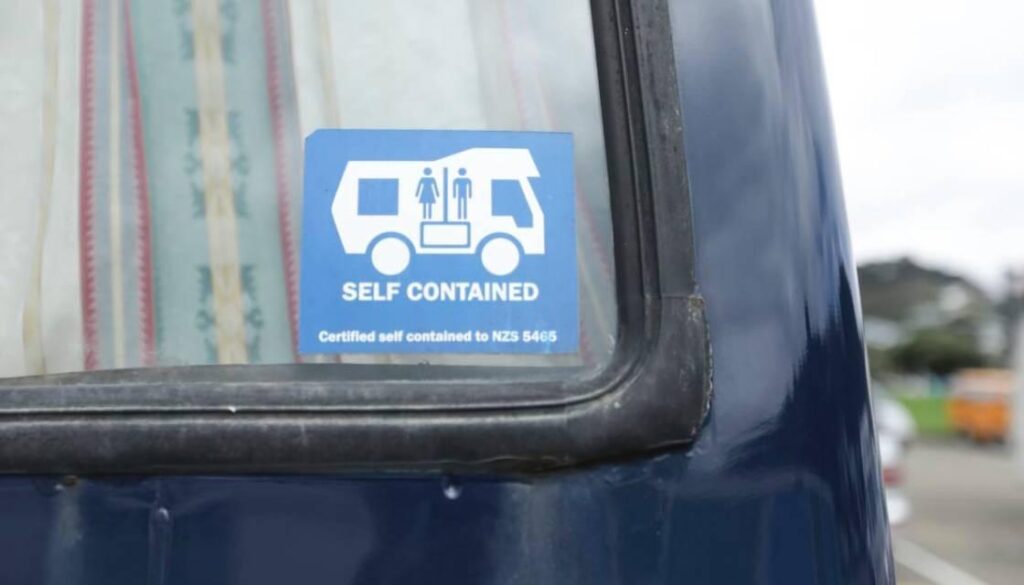
Firstly, you must confirm that your vehicle complies with the self-containment requirements. To do this, you will need to obtain a self-containment certificate for your vehicle and keep this on hand to provide to any enforcement officers upon request. You will also need to display your CSC warrant card on the front windscreen of the vehicle.
Displaying a blue responsible camper sticker alongside the mandatory warrant card is also highly recommended. While this isn’t an official requirement, doing so can help officers more easily identify your vehicle’s CSC status.
If you are hiring a campervan for your travels around New Zealand, the hire company will provide you with these documents when you collect your vehicle. If you’re unsure whether the camper you wish to hire is a CSC vehicle, don’t hesitate to ask before you take it on the road. You can also verify your hired vehicle’s certification online by looking up its registration on the NZCMS website and obtaining a copy of its current certificate.
Dispose of Waste Properly
If you need to empty your wastewater, you must do so in a responsible manner.
When doing any kind of cleaning or washing up in your CSC vehicle, you should avoid the use of non-biodegradable products/chemicals. This is because these chemicals will enter your vehicle’s wastewater system and potentially have adverse effects on sewerage network operations after the wastewater is dumped.
On that note, when you are ready to get rid of your vehicle’s wastewater, you must dispose of it safely at a designated dump station. To find your nearest dump station, you can:
- Look out for any blue dump station signs near where you’re staying
- Search for dump stations online using the AA New Zealand map
- Search for dump stations on the Camper Mate App or the Camping NZ App
Do Not Exceed the Approved Number of Occupants
Every CSC vehicle is certified to meet the ablutionary and sanitary requirements of a set number of occupants for three days minimum. If you go freedom camping in an area where only CSC vehicles are allowed, it’s important you do not exceed this number during your stay.
“Okay, but what if my camper can cater to one occupant for three days and I only want to stay somewhere for one day? Can it cater to three occupants for one day instead?”
We hear you (and we respect your mental maths skills), but unfortunately, the answer is still no. Trust us; there’s no way to skirt around this rule. In fact, ignoring it could lead to a pretty hefty fine, which kind of takes the “free” out of “freedom camping”, doesn’t it?
Can You Go Freedom Camping With Dogs in NZ?

If you want to go freedom camping in New Zealand with your dog, you can only do so on conservation land where both freedom camping and dogs are permitted. This means if you want to go to any of the freedom camping spots in New Zealand’s national parks, Fido will have to stay at home.
During your stay, you will need to keep your dog under control the entire time. If your dog is deemed a nuisance, causes damage to the area, or injures any protected wildlife species during your stay, you can be held legally responsible for this.
Freedom camping areas that allow dogs may also require you to follow additional access rules and bylaws when staying here with your fur friend. You can learn more about where you can take your dog and which rules you must follow by visiting the DOC website.
Are You Ready to Go Freedom Camping in New Zealand?
Now you know everything there is to know about responsible freedom camping, it’s time for you to start planning your journey! If you’re looking for a little extra guidance to plan the best freedom camping adventure ever, the Backpacker Deals team is here to help.
Check out our campervan hire services and allow us to assist you in finding the perfect certified self-contained vehicle for your travels.
Alternatively, if you’re already prepared to hit the road and are wondering where to go, feel free to read through our comprehensive guide to the best freedom camping spots in NZ. No matter what kind of travel advice or inspiration you need, you can count on our team to help you organise the ultimate adventure every time!




